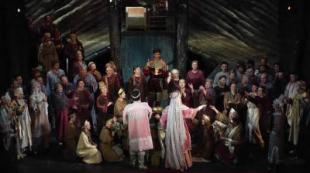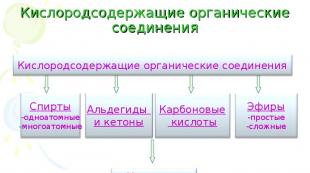For the birthday of A.S. Dargomyzhsky. Opera "Rusalka". Opera "Rusalka" - psychological musical drama Opera "Rusalka" - psychological musical drama
A.S. Dargomyzhsky opera "Rusalka"
Literary basis " Mermaids" - Dargomyzhsky's opera, became the work of the same name by A.S. Pushkin. The composer worked on the creation of this work for seven years - reverently, with soul, carefully recreating and deepening the images of Pushkin's drama. And so, note by note, scene by scene, the tragic love story of the miller's daughter was recreated by the composer in opera genre , to become over the years the most famous and beloved creation in his legacy.
Brief summary of the opera Dargomyzhsky “Mermaid” and many interesting facts about this work can be found on our page.
|
Characters |
Description |
|
| Natasha | soprano | miller's daughter, mermaid, queen of the underwater kingdom. |
| Miller | bass | a greedy pragmatist, a loving father. |
| Prince | tenor | Natasha's lover |
| Princess | mezzo-soprano | bride and wife of the Prince |
| Olga | soprano | an orphan close to the Princess |
| Little Mermaid | no vocals | daughter of the mermaid Natasha, 12 years old |
Summary of “Mermaids”

The miller's daughter Natasha is madly in love with the Prince; every day she gazes longingly into the distance, waiting for her lover. But the Prince comes less and less often, and the girl begins to guess the reason for his absence. He is forced to marry another, noble and rich girl, which he informs Natasha about at the last meeting. The prince leaves without knowing that she will soon have a child. The girl cannot live without her beloved and in despair rushes into the waters of the Dnieper.
But the Prince is not destined to find happiness with his new lover. Natasha's death dooms all participants in this drama to an unhappy life. And at the princely wedding, in the midst of the feast, as a terrible omen of this, someone’s plaintive song about tragic and deceived girlish love will sound. The princess will spend the entire marriage alone, Natasha's father will go crazy and imagine himself to be a raven, but the Prince... The Prince will meet the little Mermaid on the shore of the night Dnieper, who will tell him about the unfortunate girl, her mother, who threw herself into the water 12 years ago and became the Queen of the Underwater kingdoms. And then, under the influence of some mysterious spells, he will follow the Little Mermaid into the water...




Interesting Facts
- As you know, his drama “Mermaid” by A.S. Pushkin did not have time to complete it. Perhaps the work would not have ended with the death of the Prince if the poet had not died, but he himself decided to make the ending that way Dargomyzhsky . “Rusalka”, thus, thanks to the composer, also acquired the idea of revenge, which Pushkin did not have.
- The premiere performance was not a success. The reasons for this were: the plot - the aristocrats did not appreciate the suffering of the Miller's daughter, the reduction of many scenes, as well as completely inappropriate scenery and costumes from another opera production called “Russian Wedding”.
- Dargomyzhsky’s opera “Rusalka” is not unique in the history of Russian musical theater. The “mermaid boom” occurred in the 19th century, when a whole series of opera performances about the Dnieper mermaid were staged (for example, “Lesta, or the Dnieper mermaid” by S.I. Davydov, “The Danube mermaid” by F. Cauer, etc.

- V. Belinsky believed that the main feature of Dargomyzhsky’s musical creativity was the idea of bringing the sublime closer to the realities of life. The theme that permeates many of his works is “natural (real) school” - this theme implies the life of ordinary people from the poor class, in real terms. He also raises the issue of the "little" man and reveals his psychological aspects. It was these themes that worried Dagomyzhsky and were seriously involved in the opera “Rusalka”, as well as in many romances.
- In total, taking into account interruptions, the composer wrote the opera for about 10 years.
- By composing the opera “Rusalka,” Dargomyzhsky introduced a new direction into Russian operatic art: lyrical and dramatic everyday drama. The essence is complex human characters, which are intertwined with intense conflict relationships, and ultimately a great tragedy occurs.
- This opera is not the only work of the composer written based on the work of A.S. Pushkin. Many romances and some operas by Dargomyzhsky were also written based on poems and poems by the great writer. (Opera "The Stone Guest", romances: "I loved you...", "Vertograd", and many others).
- The famous opera singer Leonid Vitalievich Sobinov collected his stage costumes, theatrical accessories and props - creating a whole exclusive collection from this. The People's Artist was very meticulous about creating costumes, and almost always took a personal part in the process of sewing clothes. Among his first personal theatrical costumes was the image of the Prince from the opera “Rusalka”.
- In 1971, the magnificent black and white opera film “Rusalka” was shot. Among the actors you can meet such famous personalities as: E. Suponeva, O. Novak, A. Krivchenya, G. Koroleva, etc. As you know, in such films, actors and vocal performers are different people. Therefore, while watching the opera you will hear: I. Kozlovsky, V. Borisenko, E. Smolenskaya and others. It is interesting that Alexey Krivchenya, an opera singer, turned out to be such a good actor that not only his bass sounds, but also in the film he plays the Miller himself.
Popular arias and numbers
Melnik's aria "Oh, that's why all of you girls are young" - listen
Mermaid's Aria - listen
Cavatina Prince - listen
Choir "Svatushka" - listen
Music
The composer recreated the dramaturgy of “The Mermaid”, demonstrating in the libretto the great truth of life and showing the deep, soulful worlds of the main characters. Dargomyzhsky manages to convey with music the characteristic features of the characters, as well as show all the emotional experiences. Dialogue scenes in the opera occur quite often, and with their help, the composer manages to show the tense relationships between the characters. Due to this feature of the scenes, they occupy a particularly significant place (like arias, ensembles). The entire action of the work takes place against the background of an ordinary, unremarkable picture of life at that time.

Dargomyzhsky allocated a significant place to choral episodes in “Rusalka”. In the actions there are pictures that show folk life. The composer wrote most of the peasant choirs using authentic folk texts.
Ensembles in musical drama most often have a flexible arioso form; the value of words and meaning in recitatives, characterizing peak, climactic dramatic fragments, is enhanced. Dargomyzhsky writes the opera according to the principle of a “numbered” score, i.e. he designates individual numbers with familiar names - arias, duets, terzets, etc. But, the composer still often expands the ensembles in “Rusalka” to large-scale scenes. In such scenes there is an interweaving of song-aria elements with recitative and declamatory elements.
History of creation
The idea of writing an opera based on the plot of “The Mermaid” based on the poem by A.S. Pushkina originated with the composer at the end of the mid-19th century. Already in 1848 Dargomyzhsky made the first sketches on sheet music. Seven years later, in 1855, the musical creator finished the opera.
Dargomyzhsky himself wrote the libretto for the opera “Rusalka”. Despite the fact that he had to complete the end of the poem himself, the composer kept much of the original text unchanged. Among other things, he added the final scene of the Prince’s death. And he interpreted Pushkin’s images with changes, for example, in the image of the Prince he removed the excessive hypocrisy that is inherent in him in the author’s text. The poet did not pay due attention to the emotional drama of the Princess, but the composer widely developed this theme. The miller in Pushkin’s version is selfish, but Dargomyzhsky also showed him as a good, loving father. The composer preserved the image of Natasha, showing the line of characteristic changes the same as in the writer’s poem.
Productions
On May 4, 1856, the first production of the opera “Rusalka” took place at the Mariinsky Theater (St. Petersburg). The premiere turned out to be careless, sloppy (inappropriate costumes, scenery). Because of this, the theater management was dissatisfied and hostile towards this musical drama, and the audience did not like the opera. After less than 10 performances, “Rusalka” was removed from the stage. Only in 1865 was the performance resumed, which was enthusiastically received by the new audience, including the intelligentsia.
This opera is still popular on Russian opera stages. For over 150 years, “Rusalka” has been part of the repertoire of Russian theaters.
In conclusion, I would like to say that “” is incredibly relevant to the realities of any time. Such situations happen in our time, when such incidents occur in the relationship between a man and a woman. Dargomyzhsky managed to express with his music the whole palette of emotions so that while listening to this musical drama, you involuntarily join the proposed story and empathize with the main characters.
A.S. Dargomyzhsky “Mermaid”
; libretto by the composer based on the dramatic poem by A. S. Pushkin.
First production: St. Petersburg, May 4, 1856.
Characters: Prince (tenor), Princess (mezzo-soprano), Melnik (bass), Natasha, his daughter, then Rusalka (soprano), Olga, an orphan devoted to the Princess (soprano), Matchmaker (baritone), Mermaid, 12 years old.
Boyars, boyars, hunters, peasants, peasant women and mermaids.
Overture
The opera opens with a dramatic overture. It masterfully merges into one musical whole the themes and motifs that will be developed further in the opera and which characterize the main characters and main events of this drama. First we hear the sounds of the prince's wedding, then the image of the princess's sadness emerges, fantastic phrases from the underwater kingdom flash, melodies from the violins from the scene when the miller's daughter, in great excitement, announces to the prince that she will soon be a mother, and immediately behind this - the mysterious shimmer of the melody and harmonies from the last scene of the opera.
Act one
Natasha sits thoughtfully on the banks of the Dnieper. Her heart is anxious, and it is not easy for her to listen to the instructions of her father, the old Miller. For several days now, the Prince, her beloved, has not come to Natasha. The Miller teaches her how to behave with the Prince. It would be nice to receive a rich gift or money from the Prince. Natasha greets the arriving Prince with trepidation. He greets her kindly, but immediately tells her that he must leave soon. The prince seems embarrassed, he is not saying something. Natasha notices a change in him. Even the expensive necklace that the Prince gives her briefly distracts her from her bad feelings. Having gathered courage, the Prince informs Natasha about the upcoming separation and about his marriage. Natasha is numb with grief. She painfully tries to remember something important that she wanted to tell the Prince. Finally, this important thing flashes brightly in her memory - she will soon become a mother. The prince asks Natasha to take care of herself and quickly leaves. Natasha's grief is limitless. In despair, she tears off her pearl necklace, tears off the bandage in expensive stones from her head and, with the thought of revenge, rushes into the Dnieper.
Act two
The Prince's wedding is celebrated in rich mansions. Everyone congratulates the newlyweds and wishes them happiness. And only one voice at a cheerful holiday begins to sing a sad song about how a girl, abandoned by her boyfriend, drowned in the river. The prince recognizes Natasha's voice. The fun is ruined. However, everyone is trying to pretend that nothing happened. The guests raise their glasses. The prince kisses his wife, at the same moment a loud female moan is heard in the crowd. Everyone is confused.
Act three
Picture one. The days of the Princess pass in melancholy and constant anticipation of the Prince. The prince disappears while hunting. The princess recalls the irrevocably flashed first joyful days of marriage. The hunter returns and reports that the Prince was left alone on the banks of the Dnieper.
Picture two. Evening. Mermaids come to the shore of the Dnieper, but when they hear someone’s steps, they hastily rush into the water and disappear. The Prince stops near the collapsed mill. With sadness he thinks about Natasha, whom he loved dearly. Suddenly, a crazy old man appears, calling himself a raven; the Prince recognizes him, not without difficulty, as the old Miller. Wanting to help the poor old man, the Prince invites him to his mansion, but he wildly shouts, “Give me my daughter!” rushes at him. The servants arrive in time and save the Prince.
Act four
Picture one. Underwater mermaid tower. Twelve years have passed since Natasha, rushing into the Dnieper, turned into a Mermaid, but the thirst for revenge has not faded in her. And now her hour has come - the Prince is here, close. Calling her daughter, the Mermaid tells her to go ashore and lure the Prince to the Dnieper.
Picture two. The Prince stands thoughtfully on the banks of the Dnieper, thinking about Natasha. Suddenly the Little Mermaid appears. She tells the Prince about her mother, who became the queen of the Dnieper waters, and invites her to the tower at the river bottom. In the power of incomprehensible spells, the Prince obediently follows the Little Mermaid. Princess and Olga run out from behind the mill. They try to hold the Prince, but the inviting voice of the Mermaid beckons him. The Miller, who arrived in time, pushes the Prince into the water. The mermaids draw the Prince to the feet of their queen.
V. Pankratova, L. Polyakova
RUSALKA - opera by A. Dargomyzhsky in 4 d. (7 k.), libretto by the composer based on the drama of the same name by A. Pushkin. Premiere: St. Petersburg, Circus Theater, May 4, 1856, under the direction of K. Lyadov.
Characterizing his creative plan, the composer wrote to V. Odoevsky: “As I study our folk musical elements more, I discover more diverse sides in them.<...>To the best of my ability and ability, in “Rusalka” I am working on the development of our dramatic elements.” Dargomyzhsky correctly defined the character and direction of the future opera, in which the psychological drama is revealed as a social drama. The composer does not idealize Melnik. At first he portrays him as a selfish, crafty person, currying favor with the Prince. But the conditions of his life made him this way, having distorted his moral nature. When trouble befalls the Miller’s daughter, an ardent paternal feeling awakens in him, and Natasha’s suicide drives him to madness. The image reaches deep truth, poetry, and lyricism. The image of Natasha is one of the best female images of Russian opera.
The drama of the characters is shown against a bright background. The composer used the ritual side of Russian life in a variety of ways, introducing play and song elements. The nature of the music is folk. Striving to truthfully convey life in all its manifestations, the composer organically combines dramatic and comedic, genre, everyday and lyrical elements. Hence the richness of the music's content, its impressive power.
The recitative of “Rusalka” was a new word in Russian and world music - truthful, poetic and emotionally expressive. All the characters’ experiences, including subtle and subtle ones, are expressed truthfully and simply. The recitative is imbued with broad chanting and songfulness; at the same time, he is faithful to the principle of declamation. The fantastic scenes (at the bottom of the Dnieper) were less successful. In the sphere of fairy tales, the composer felt less free. While remaining faithful to Pushkin in the central and turning scenes, Dargomyzhsky psychologically deepened the drama of ordinary people. All the composer’s experience in the field of studying folk life, Russian song, experience as a creator of romances and songs, as well as his increased skill as a musical playwright compared to Esmeralda, were manifested in “Rusalka”.
Fierce controversy flared up around the opera. The democratic musical community and criticism warmly welcomed her, but the conservative press reacted to her with hostility. Justice triumphed, although not immediately. At first, few people appreciated the opera. The composer wrote with bitterness in 1857 to his student, singer L. Belenitsyna (Karmalina): “Most of our music lovers and newspaper scribblers do not recognize me as an inspiration. Their routine gaze searches for melodies that are flattering to the ear, which I do not pursue. I don't mean to reduce music to fun for them. I want the sound to directly express the word. I want the truth. They don’t know how to understand this.” The position of the conservative press, which rejected Rusalka, was shared by the management of the imperial theaters. Despite Petrov’s brilliant performance of the Melnik part and the overall success of the opera, it was rarely performed. The performance was poorly staged.
The merit of the revival of “The Mermaid” belongs to the artists F. Komissarzhevsky (at whose benefit performance on December 17, 1865 the opera was resumed in St. Petersburg), O. Petrov and Y. Platonova. “Rusalka” this time was a huge success and entered the repertoire forever. A. Serov and Ts. Cui determined its role in the history of the national theater. Serov devoted ten articles to the analysis of the opera. He wrote: “One of the most precious aspects of the talent of the composer of “Rusalka” is precisely the “truth” of musical expression. He serves this truth constantly, honestly and often to the detriment of the external effect, which would not be at all difficult to achieve by other, more ordinary means. But where all the requirements for showiness and dramatic situation merge with musical “truth,” there is complete triumph for the author of “The Mermaid.” His music then has a profound, irresistible effect even on those who, for many reasons, cannot sympathize with the beauty of his style.”
O. Petrov created the brightest, and perhaps only surpassed by Chaliapin, image of the Miller. He laid the foundation for the stage tradition of playing this role, just as Y. Platonova created the stunningly dramatic image of Natasha. The main parts were performed by major Russian artists, including I. Melnikov, M. Karyakin, K. Serebryakov, N. Salina, F. Litvin, L. Sobinov, D. Smirnov; masters of the Soviet stage - K. Derzhinskaya, A. Pirogov, M. Reisen and others.
F. Chaliapin did not know his opponents in the role of the Miller. He worked on it since his youth (1893). According to one contemporary, Chaliapin’s Miller is “a kind, narrow-minded man, firmly aware of the ostentatious rules of everyday morality, but undemanding in relation to true morality, in his own way passionately loving his daughter, but not wanting to miss the benefits that flow into his hands with her help, In general, he is a spontaneous nature, with cunning and cunning. And the more terrible the unexpected blow must have been for him... a blow that extinguished his reason. The power of facial expressions and dramatic experience in Chaliapin reaches such a degree in the last scene of the first episode that it is difficult to resist tears when you hear the words of the Miller addressed to his daughter: “I would be ashamed, even in front of the people, to reproach my own father like that!” All the sorrow of the father’s soul pours out in these words."
The culmination of the development of the image is the third stage. “Instead of the venerable, prudent Miller, something terrible jumps out into the clearing: a man is not a man, some kind of forest monster. A dull gaze, a long, randomly disheveled and faded beard, thin gray tufts of hair fluttering in the wind, in which straws are tangled; stupidly extended to the side, like wings, hands with curled fingers, rags on the shoulders.” The critic wrote further: “It’s worthy of surprise... the subtle change of insane delirium... and in general the great softness of the performance, especially when he begins to sing: “Yes, I’ve become old and playful, it’s not bad to watch me.” Some kind of childish meekness and helplessness breaks through at times, as if this unfortunate man, who has lost his mind from grief, is indeed just a big, old, helpless child.” However, in the insane Melnik, Chaliapin revealed not only the traits of childishness and helplessness, evoking sympathy and pity. There was a tragic power in this image. Instant and sharp transitions from one state to another emphasized the growing madness of the grief that broke the Miller's strength, the depth of his love for his dead daughter was revealed with unique truthfulness.
The tradition coming from Petrov - Chaliapin was continued by their successors, and above all by A. Pirogov.
“Rusalka” is one of the most popular and beloved operas of our audience. It was included in the repertoire of many domestic theaters and was performed abroad - first by Russians, then by artists of national theaters. In 1888, it was performed by Russian singers in Copenhagen, in 1908 - in Berlin, in 1909 - in Monte Carlo (Chaliapin, Smirnov, Litvin), in 1922 - in San Francisco and New York. Productions by foreign singers were carried out in Paris (1911), Jerusalem (1926), Helsinki (1937), Bucharest (1958), etc. In 1899, Italian singers performed in “Rusalka” in St. Petersburg (A. Masini - Prince ). In recent years, the opera is rarely staged in the leading theaters of our country (at the Bolshoi - in 2000, under the direction of M. Ermler).
The opera takes place on the banks of the Dnieper. Natasha, the miller's daughter meets her beloved prince. Their relationship has been going on for a year now, the young people love each other. Natalya's father, an old miller, is happy about their romance, and constantly wants to benefit from this love.
Time passes, the prince began to visit his beloved less and less. Natasha misses him very much and is looking forward to meeting him. One day, hearing the clatter of hooves, a girl hurries to meet her beloved. The miller, meanwhile, reminds his daughter of the need for this relationship. But, not everything is so simple, the prince came to part with Natasha. He fell in love with another girl, which he told the miller's daughter. Saying goodbye, the prince gives Natasha gifts. The girl is upset, she tells her lover that she is expecting their child. The prince promises not to forget them and to help financially. Natasha cannot survive such grief, she ran to the river and threw herself into the water. The miller could not hold her.
The prince arranged a magnificent feast on the occasion of his wedding. The fun is in full swing, everyone is singing and rejoicing. Suddenly, amid the cheerful songs, Natasha’s mournful voice is heard. The prince asks the servant to find the girl and take her away from the yard. The young princess is saddened, the sad songs at the wedding are unpleasant to her, she believes that this is a disaster. When the newlyweds kissed, a drawn-out female moan was heard from the crowd of guests. The wedding is completely ruined.
Almost twelve years have passed. The prince's marriage never worked out. The princess believes that he has someone else.
One day, the prince came to the Dnieper. He had been drawn there for a long time by an irresistible longing. Suddenly he saw a man in rags; it was a miller. The old man completely lost his mind after the death of his daughter. He rushed with claims to the prince. And what he heard made him feel even worse.
Somewhere at the bottom of the Dnieper lives the queen of mermaids, she has a lovely little mermaid daughter. She is twelve years old. She told her mother that she often goes to the shore and communicates with her grandfather. The queen asked her daughter to lure the prince to the bottom, saying that he was her father. Rusalka Natalya has never come to grips with her feelings; she still loves the prince.
Arriving ashore, the prince met a little mermaid, she told him about her origin and invited him with her. His wife was watching the man, and then the princess spoke to him. At this time, the voice of the queen of the mermaids was heard, and the old miller pushed his failed son-in-law into the water. The queen's subjects delivered the prince's body to their mistress.
This work teaches you to take responsibility for your actions.
Picture or drawing Dargomyzhsky - Mermaid
Other retellings and reviews for the reader's diary
- Summary The side where the wind is Krapivina
Genka has been unable to pass English for a long time. The circumstance may result in unpleasant consequences for him. He may be left for a second year, and if the situation is not corrected, his father threatens to punish him severely.
- Summary of The Life of Mister de Moliere Bulgakov
Comedian Jean Baptiste Poquelin influenced the work of Mikhail Bulgakov and also his life so much that the writer decided to dedicate a book to him.
- Summary of Gogol Rome
The young prince, who was born and raised in old Rome, leaves to study in Paris. A progressive European city amazes and captivates a young man with its brilliance, ebullience of passions, sciences, and politics. Restaurants, cafes, shops, theaters - everything sparkled and beckoned.
- Summary of Food of the Gods Wells
This is a work of fiction. It describes the story of unfortunate inventors who created miraculous food. This food transformed all living organisms.
- Petrushevskaya
Lyudmila Stefanovna Petrushevskaya is one of the most popular Russian writers. She is known as the author of books, scripts for theater and cinema, poetry, and translations. Petrushevskaya began writing in her early youth.
Opera by A. S. Dargomyzhsky “Rusalka”
Dargomyzhsky's opera “Rusalka” has become a significant phenomenon in the history of Russian music - it is the first Russian opera in the genre of everyday psychological drama. In it, the author embodied one of the many versions of the legend about a deceived girl, turned into a mermaid and taking revenge on her offender.
The plot was based on the unfinished drama of A. S. Pushkin, published after the poet’s death under the title “Rusalka”.
A. S. Dargomyzhsky began working on the opera in the second half of the 40s. The opera "Rusalka" was completed in 1855.
The premiere took place in May 1856 in St. Petersburg.
The attitude towards the opera was ambivalent: the aristocracy was contemptuous, and democratically minded theatergoers were enthusiastic.
The opera is wonderful. The psychological drama plays out here no worse than in the opera "Rigoletto." Wonderful arias and all the music. The music, acting and singing of the Bolshoi Theater artists make the opera simply amazing.
Brief summary of the opera.
The Miller's daughter Natasha is waiting for her passionately beloved Prince. She absentmindedly listens to the boring teachings of her old father, who tells her about the need to benefit from the Prince’s favor. The Prince appears. However, he came only to say goodbye forever: he will marry a girl of noble origin. The prince is trying to pay off with luxurious gifts to Natasha and cash gifts to her father. Shocked, Natasha admits to the Prince that she is soon to become a mother. The prince is leaving. An abandoned girl gives vent to her grief. She bitterly reproaches her father for the fact that, driven by greed, he indulged her affair. In despair, she throws herself into the river.
12 years have passed. Princely tower. The princess is sad alone. Her husband has lost interest in her, he is unkind, and leaves home for a long time. The Princess's close friend, playful Olga, tries to entertain her with a cheerful song. Having learned that the Prince decided to stay alone at night on the banks of the Dnieper, the Princess, together with Olga, goes in search of him.
Night. The bank of the Dnieper near a destroyed mill. Mermaids dance in circles. The Prince arrives. He is tormented by the thought of Natasha's lost love. Suddenly, a scary figure in rags appears from behind the trees. This is the mad Miller, who leads a wandering life in the forest and imagines himself as a raven. The old man's delirium has a depressing effect on the Prince. The miller tries to strangle his daughter's killer. The hunters arrive in time and save their master.
The proud and powerful queen of mermaids, Natasha sends her daughter to the shore and instructs her to lure her father into the water with affection and cunning. Left alone, she triumphs over the approaching hour of her long-planned revenge.
Accompanied by Olga, the Princess tracks down her husband. The little Mermaid comes out to meet the emerging Prince and calls him to the bottom of the river, assuring him that his old love awaits him there. Overwhelmed by memories of Natasha, the Prince is ready to follow his daughter. The princess and Olga are trying to hold him back. From the Dnieper comes the alluring call of a mermaid. The girl carries the Prince away, and the Miller, who arrives in time, pushes him into the water.
Bolshoi Theater - opera "Rusalka"
ALEXANDER SERGEEVICH DARGOMYZHSKY
MERMAID
Opera in four acts (six scenes)
The libretto based on the dramatic poem by A. S. Pushkin was written by A. S. Dargomyzhsky.
The first performance took place on May 16, 1856 on the stage of the Bolshoi Theater in
Petersburg.
Characters
Prince tenor
Princess mezzo-soprano
Melnik bass
Natasha, his daughter, then soprano Rusalka
Olga, an orphan, soprano devoted to the Princess
Swat baritone
Little Mermaid, 12 years old
Boyars, boyars, hunters, peasants, peasant women and mermaids.
Act one. Natasha sits thoughtfully on the banks of the Dnieper. Her heart is anxious, and it is not easy for her to listen to the instructions of her father, the old Miller. For several days now, the Prince, her beloved, has not come to Natasha. The Miller teaches her how to behave with the Prince. It would be nice to receive a rich gift or money from the Prince. Natasha greets the arriving Prince with trepidation. He greets her affectionately, but immediately says that he must leave soon. The prince seems embarrassed, he is not saying something. Natasha notices a change in him. Even the expensive necklace that gives her
The prince briefly distracts her from her bad premonitions. Having gathered courage, the Prince informs Natasha about the upcoming separation and about his marriage.
Natasha is numb with grief. She painfully tries to remember something important that she wanted to tell the Prince. Finally, this important thing flashes brightly in her memory - she will soon become a mother. The prince asks Natasha to take care of herself and quickly leaves. Natasha's grief is limitless. In despair she breaks into
himself a pearl necklace, tears off the bandage in expensive stones from his head and, with the thought of revenge, rushes into the Dnieper.
Act two. The Prince's wedding is celebrated in rich mansions. Everyone congratulates the newlyweds and wishes them happiness. And only one voice on the merry
The holiday starts with a sad song about how a girl, abandoned by her boyfriend, drowned in the river. The prince recognizes Natasha's voice. The fun is ruined. However
everyone is trying to pretend that nothing happened. The guests raise their glasses. The prince kisses his wife, at the same moment a loud female moan is heard in the crowd.
Everyone is confused.
Act three. Scene one The days of the Princess pass in melancholy and constant anticipation of the Prince. The prince disappears while hunting. The princess remembers
the first joyful days of marriage flashed by forever. The hunter returns and reports that the Prince was left alone on the banks of the Dnieper.
Picture two. Evening. Mermaids come to the shore of the Dnieper, but, hearing someone’s steps, they hastily rush into the water and disappear. The Prince stops near the collapsed mill. He thinks with sadness about Natasha, whom he loved dearly. Suddenly, a crazy old man appears, calling himself a raven; the Prince recognizes him, not without difficulty, as the old Miller. Wanting to help the poor old man, the Prince invites him to his mansion, but he wildly shouts, “Give me my daughter!” rushes at him. The servants arrive in time and save the Prince.
Act four. Scene one. Underwater mermaid tower. Twelve years have passed since Natasha, rushing into the Dnieper, turned into a Mermaid, but the thirst for revenge has not faded in her. And now her hour has come - the Prince is here, close. Calling her daughter, the Mermaid tells her to go ashore and lure the Prince to the Dnieper.
Scene two. The Prince stands thoughtfully on the banks of the Dnieper, thinking about Natasha. Suddenly the Little Mermaid appears. She tells the Prince about her mother, who became the queen of the Dnieper waters, and invites her to the tower at the river bottom. In the power of incomprehensible spells, the Prince obediently follows the Little Mermaid. Princess and Olga run out from behind the mill. They try to hold the Prince, but the inviting voice of the Mermaid beckons him. The Miller, who arrived in time, pushes the Prince into the water. The mermaids draw the Prince to the feet of their queen.









